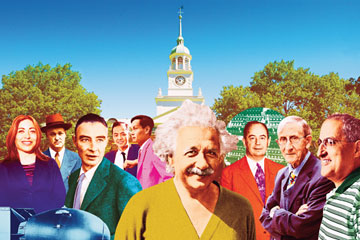
(4 of 6)
Vladimir Voevodsky, a 47-year-old Russian mathematician and faculty member at the institute, is showing me how to teach a computer to do math. Padding across his office in black rubber Adidas sandals, past bookshelves stocked with science-fiction novels, he sits down at his computer next to a pile of scratch paper and opens a program that looks sort of like a word processor. As Voevodsky types each step of a proof, the computer checks his work and in the process learns how to perform the proof. The idea is to teach the computer higher-level reasoning that might eventually surpass humans'.
Voevodsky's abstract credentials are unimpeachable; his work in algebra won him a Fields Medal in 2002. But his project has a practical edge. If computers learn at this high level, they could teach math to humans and test new theories that are too difficult for humans to check. The potential for applications--and the decision to bring computer scientists to the institute for the first time since von Neumann built his computer in the 1940s--raised eyebrows. Voevodsky says the reception from fellow faculty was "cool but not cold" and that he wanted to do "math that is useful."
Not everyone at the institute shares that view. Nils Baas, 67, a visiting Norwegian mathematician, bristled when I asked if his efforts to classify cancer more precisely would lead to better treatments. "I'm studying this out of curiosity," he said. "Treatment is a nice benefit, but it shouldn't be the drive." Voevodsky disagrees: "This kind of attitude is a manifestation of one's own infantility."
It's also just the kind of thing that rankles many lawmakers when it comes to funding scientific research. "They relish in the fact that they are irrelevant," says Atkinson. "Scientists come up to Capitol Hill and say, 'We want money.' You say, 'Why?' and they say, 'You have no right to ask us that.'" Though quirky-sounding research has been a favorite target for some lawmakers going back to Senator William Proxmire's Golden Fleece Awards and beyond, the tension is particularly pronounced now, in the supercharged partisan atmosphere of budget debates.
